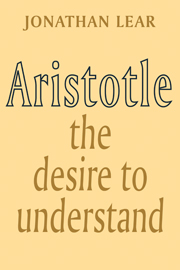5 - Ethics and the organization of desire
Published online by Cambridge University Press: 04 August 2010
Summary
The point of the Nicomachean Ethics
One reason for going back to Aristotle's ethics is to study how profoundly different his ethical outlook is from our own. It is fair to say that we live today without a coherent and compelling morality. There are various moral strands which pull in various directions, but when pushed for a justification we find it hard to explain why we should hold the moral beliefs we do hold. Much of what constitutes the Western moral outlook is inherited from the Judaeo-Christian tradition, and if 300 years ago one were asked, for example, why you should do unto others as you would have them do unto you, one would have undoubtedly given a religious answer. In the past 300 years there has been a dramatic loss of confidence in the ability of religious belief to ground a moral outlook. In part this loss is due to a growing conviction that moral beliefs ought to be justifiable other than by appeal to divine authority: they ought to appear reasonable to a moral agent. But with the loss of confidence in religion's ability to ground morality, no other form of justification has come to take religion's place. There are other forms of justification, to be sure, but none commands universal or deep respect.
One way in which we differ from the Greek world in which Aristotle lived is that we place more emphasis on intention than on act.
- Type
- Chapter
- Information
- AristotleThe Desire to Understand, pp. 152 - 208Publisher: Cambridge University PressPrint publication year: 1988
- 1
- Cited by



